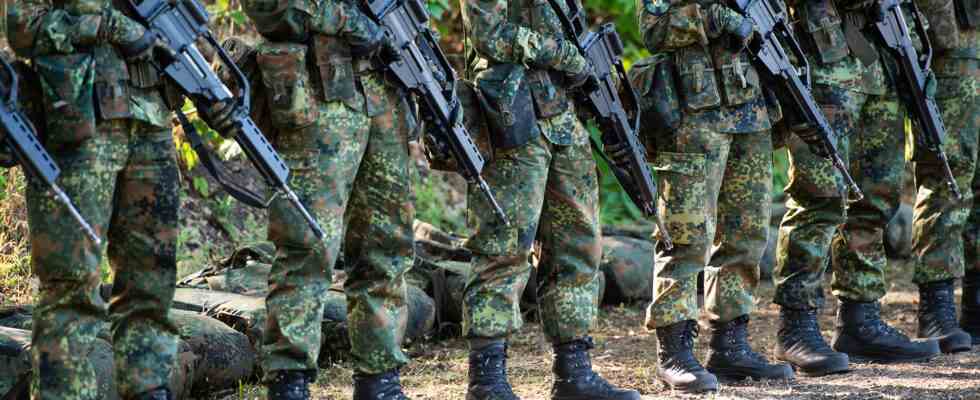Status: 03/23/2022 11:13 a.m
It’s a new feeling for the Bundeswehr: There should be billions of euros for new equipment. But the authority that is supposed to procure all this is considered neither fast nor efficient. Can this go well?
Even the name sounds complicated: Federal Office for Equipment, Information Technology and Use of the Federal Armed Forces – BAAINBw for short. There are 6,500 jobs at the headquarters in Koblenz alone. A total of 11,000 employees work at the procurement office, as it is more colloquially called, at 116 locations. You are responsible for equipping the Bundeswehr with modern equipment and acquiring it at economical conditions.
The tasks also include testing everything before purchasing. From the canteen to the infantry fighting vehicle. According to its own statements, the BAAINBw currently has 1,500 ongoing new procurement projects to deal with.
Complicated Processes
The BAAINBw is an important link in the supply chain. Roughly sketched, it goes like this: The troupe wants something or something is broken. Authorities – here the planning office of the Bundeswehr also comes into play – check whether the troops can help themselves. Otherwise, servicewomen and men draw up a catalog with specific requirements together with the administration.
He is given the nod from above – often actually by the Inspector General of the Bundeswehr himself. Then in the BAAINBw the procurers translate the catalog into technical descriptions of services. These will be approved again. A Europe-wide call for tenders often precedes the purchase. And after the purchase, there are often legal consequences. For example, there is still a legal dispute about the successor to the G36 assault rifle. In the next few days, a verdict is to be made by the Düsseldorf Higher Regional Court, and the bidding competition began in 2017.
“Too long, too expensive, doesn’t work”
“It takes an extremely long time, it’s much more expensive than planned, and it usually turns out that it doesn’t work as desired,” says Frank Sauer from the University of the German Armed Forces in Munich, criticizing the process. He also calls for a change in mentality in the Bundeswehr administration. “We finally have to come up with faster, more pragmatic solutions instead of just playing this eternal decision-avoidance game.”
From his point of view, too many places are involved in decisions. “And in the end, if something goes wrong, no one is really responsible anymore. That can’t be. There must also be a delegation of responsibility downwards.” And since he – like many other experts – also sees the procurement office as having a duty. Especially now, when additional billions will soon flow into the armaments industry. With reference to the ongoing process, the BAAINBw is currently not commenting on the planned special fund for the Bundeswehr.
The authority defends itself
The association of civil servants and employees of the Bundeswehr defends itself against criticism of the office. Procurement law is not the only thing preventing quick processes: “The unreliability of the armaments industry, the lack of planning, the lack of budgetary funds, the constant influence of lobbyists and the lack of strategic control from the ministry also play a significant role.” According to the procurement office, there are currently 1,000 vacancies in Koblenz. But many consider the authority to be too big anyway.
Reforms have so far always failed
The calls for reforms in the office, especially in the procurement processes themselves, are not new. Ten years ago, she asked for a structure commission. The attempts by ex-defense minister Ursula von der Leyen, described by many observers as good, to use external consultants failed. The annual warnings in the military report, such as those from the military commissioner Eva Högl, usually only brought minor changes.
Lambrecht is looking for solutions
The war in Ukraine now seems to be speeding things up. Federal Defense Minister Christine Lambrecht has announced that she will make greater use of exceptional rules in public procurement law so that she no longer has to put out tenders across Europe. However, experts believe that this is only temporary and possible in exceptional cases.
And the minister wants purchases for the troops to go through the procurement office only from a value of 5,000 euros. Previously, the limit was 1000 euros. According to the minister, this affects every fifth order. “That means that I no longer need a very bureaucratic award procedure for more than 20 percent of such orders,” says Christine Lambrecht on Deutschlandfunk.
turning point in the mind
“A lot is possible if only the political will is there,” says Sauer. For him, however, fundamental changes are more important than these adjustments. “The turning point has been proclaimed rhetorically and the money has also been budgeted. Now you have to implement it, and that means rethinking.”

